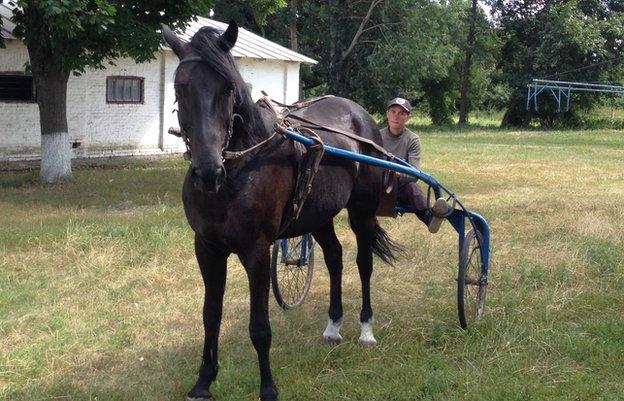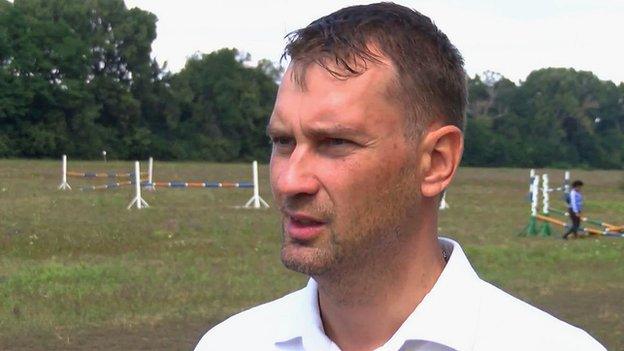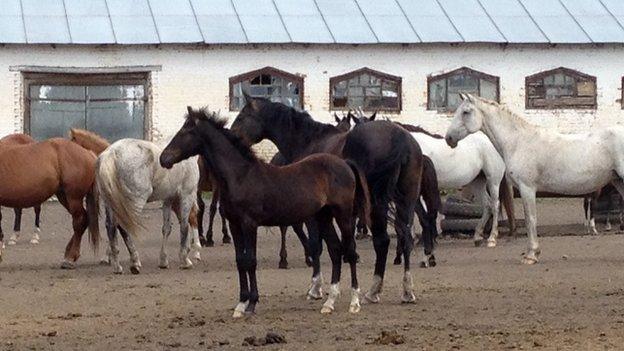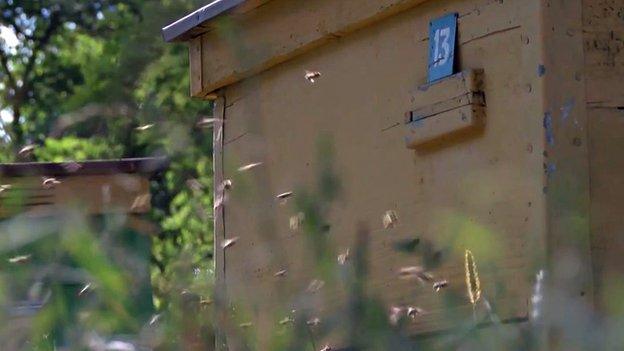Horses for sale in Ukraine's privatisation drive
- Published
David Stern reports on Ukraine's extensive privatisation programme
Ukraine's government intends to privatise some 340 state-owned companies in the next few months in a sweeping programme that officials hope will reduce inefficiency, halt billions of dollars in losses and strike a decisive blow against corruption.
The programme's authors have set an ultimate goal of selling off the more than 2,000 businesses belonging to the government, leaving only 15-20 "strategic" enterprises, like railroads and major utilities.
The present privatisation drive will see an array of companies placed on the auction block - including power plants and various agricultural concerns, that will affect more than one million people who work at them and untold numbers in the communities where they are based.
And not all who will feel the effects will be humans. Also listed on the government's balance sheet are more than 1,000 horses, which are being kept on 11 state-owned horse breeding farms across the country.
One of these is the Dibrivsky horse breeding farm, located a two-hour drive to the east of Kiev in the Poltava region. It was founded in 1888 but now, because of its possible sale, faces an uncertain future.
The farm is home to around 270 horses, mostly of two breeds: Orlovsky Trotters and Russian Trotters, both racing horses.

Dibrivsky's main income comes not from its horses but from its 5,500 hectares of farmland
On a recent warm, crackling-dry August day, the beauty of these animals and the idyllic setting of the farm were on full display. About 90 of them, including a number of wary colts, were gathered in a corral, drinking water.
In a nearby field, jockeys took a couple of horses out for a run, while an equestrian class practised trotting and taking jumps. All around were the green, rippling fields of the Ukrainian countryside.
Demand challenges
But for all Dibrivsky's romantic charm, many ask - why should the Ukrainian government be in the horse-breeding business?
And if it does put the farm up for auction, then another question arises:
Who would buy it or any of the other farms, or the other companies on the government's list for that matter - given the country is currently suffering a major economic depression and is struggling against a Russian-backed insurgency in the east?
Government officials accept that the Dibrivsky sale might face challenges.
"I suppose it would not be easy," says Oleksii Zubrytsky, an adviser to Ukraine's agriculture minister. "First of all we have a lot of private farms, which are quite successful."

The main challenge will be finding buyers for these stare assets, says government adviser Oleksii Zubrytsky
"But the main problem is the demand," he adds. "In order to sell horses, we need to create a demand. And due to the crisis in the country, this demand is not so good."
Equine activities in fact only constitute a small part of the horse breeding farm's activities. Dibrivsky raises pigs and cows, and also produces honey and fermented mare's milk, which is a local delicacy.
Most of its money comes not from its horses, but from its 5,500 hectares of surrounding farmland, where it grows wheat, soya and oats. The situation is mirrored among the other horse farms in the government's possession.
Corruption and mismanagement
According to Mr Zubrytsky, 80% of the farms' incomes come from agriculture, on some 40,000 hectares. Raising other animals accounts for 15% of earnings - and just 5% comes from the horses themselves.
And this arrangement, he says, fuels corruption.
"We have a lot of shadow businessmen, who use the access of the state-owned enterprises to the land, probably free of charge," says Mr Zubrytsky.

Ukraine's horse-breeding farms are costing the state $10m a year in losses
"They use this access and take all the profits, leaving the cost to the state enterprises. This is the biggest problem."
The corruption and mismanagement of government-owned businesses have resulted in gargantuan losses to the state, officials say. At the horse breeding farms, the figure is around $10m (£6.3m).
For state-run companies as a whole, the deficit is some $5bn - a figure that the struggling country can hardly afford to throw away.
"This is what the country spends for national security for the whole year," says Adomas Audickas, who runs a team in the economics ministry spearheading the privatisation process.
"These companies could earn $5bn in profits if they were run efficiently, and the same as in the private sector."

The farm also produces its own honey and fermented mare's milk
"So if you are to privatise them, you're going to have fewer losses, and you'll have income to the state," he adds.
Future concerns
Many agree - including the director of the horse farm system, Denis Ptushko. Privatisation is the "only life preserver" for the horses, he says.
But he also worries about what the future holds.
"This horse farm is located in the village of Dibrivka. During the harvest season, 120 to 130 people work here.
"No one else can offer as much work as this horse farm. This is also an important point that needs to be considered."
Looking out at the dozens of horses surrounding him, Mr Ptushko adds: "But the most important thing is for privatisation to take place in such a way so that these horses fall into the hands of someone who can protect them."